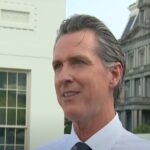








President Donald Trump is eyeing a controversial solution to tackle mental illness on America’s streets. In an Oval Office interview with the Daily Caller, he floated the idea of bringing back insane asylums, a move that’s sure to spark debate. It’s a bold stance, but is it the answer to a growing crisis?
The Daily Caller reported that Trump sat down with Daily Caller White House Correspondent Reagan Reese on Friday for a wide-ranging, hour-long discussion that covered some revolutionary proposals.
He outlined his efforts to clean up Washington, D.C., through the D.C. Safe and Beautiful Task Force, while also expressing openness to reopening asylums for those with severe mental illness.
The full transcript of the interview will be released on Monday evening. Trump’s comments come as he ramps up efforts to restore order in the nation’s capital.
On August 7, he deployed federal law enforcement and the National Guard to form the D.C. Safe and Beautiful Task Force. This operation has already yielded significant results, though some question its long-term impact.
The task force has been active, with 1,369 arrests reported by August 29. Among those detained were several unauthorized migrants, including 12 known members of gangs like MS-13 and TDA. The operation also located five missing children and dismantled 50 homeless encampments.
Trump’s focus on D.C. reflects his broader ambition to address urban decay in cities like Chicago and New York. He’s made no secret of his desire to expand these efforts, arguing that unchecked crime and homelessness threaten public safety. Critics, however, warn of overreach and the need for more nuanced solutions.
The idea of reviving asylums stems from Trump’s observation that states like New York and California once relied on them.
He noted that facilities like Creedmoor and Bellevue in New York were shuttered due to high costs, releasing patients into society. “They released them all into society because they couldn’t afford it,” Trump said.
Trump’s asylum proposal is rooted in a belief that some mentally ill individuals pose a public danger. “You can’t have these people walking around,” he told Reese, emphasizing the risks of untreated mental illness. Yet, the idea of reinstitutionalization raises ethical questions in a society that values personal freedom.
Reese herself highlighted the personal toll of urban disorder, sharing that she moved from Washington, D.C., to Virginia after an attempted break-in at her Capitol Hill home.
She also recounted witnessing a homeless person assault a pedestrian in Virginia just a week ago, prompting her to call 911. These anecdotes underscore the urgency Trump is tapping into.
Trump’s rhetoric is unapologetic, often leaning into a no-nonsense approach. “So dangerous, so dangerous,” he said of the current state of affairs, suggesting that some individuals could remain a threat well into old age. His supporters see this as refreshing candor; detractors call it alarmist.
The D.C. Safe and Beautiful Task Force has stirred both praise and criticism. Trump’s decision to federalize D.C. police and deploy the National Guard shortly after August 7 signals a muscular approach to law enforcement.
Trump’s defenders argue that his policies address a crisis long ignored by progressive leaders. The closure of asylums, he claims, left society grappling with consequences that are now visible on city streets.
“They had a lot of them, Bellevue, and they were closed by a certain governor,” he remarked. Still, the asylum proposal is a lightning rod.
Advocates for mental health reform argue that institutionalization often failed patients in the past, prioritizing containment over care. Trump’s suggestion, while bold, sidesteps the complexities of modern mental health treatment.
Trump’s broader vision includes zero tolerance for crime, as seen in his D.C. initiative. “I call it a crime-free zone because we don’t play games,” he said, describing a policy where law enforcement can respond decisively. This approach resonates with those fed up with rising crime, but worries civil liberties advocates.
Reese’s experience in Virginia, where she felt compelled to flee D.C. for safety, mirrors a sentiment Trump is leveraging.
“Why is that a big thing? People are thinking about that?” he asked, suggesting public support for his ideas. Yet, without broader investment in mental health, critics argue, asylums are a simplistic fix.



